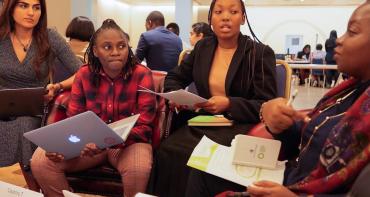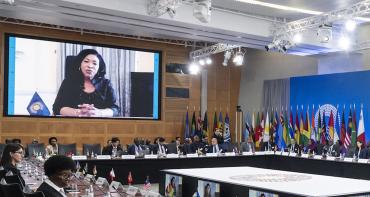When 197 countries adopted the Paris Agreement on Climate Change in 2015, I remember feeling an extraordinary surge of hope – for multilateralism, for science, for humanity.

When 197 countries adopted the Paris Agreement on Climate Change in 2015, I remember feeling an extraordinary surge of hope – for multilateralism, for science, for humanity.
Years of advocacy in support of small and vulnerable Commonwealth states had finally culminated in a binding pact to tackle the greatest threat to Planet Earth, together.
No one expected that just five years later, a deadly pandemic would throw everything we had worked for into dreadful disarray.
Now, as countries grapple with the debilitating impacts of COVID-19, it can even seem like the focus on climate action has diminished, despite the reality that the world remains far off course to keep global warming to 1.5 degrees.
Worrying trends
Keeping below this threshold to ensure the planet’s survival requires halving greenhouse gas emissions by 2030 and achieving worldwide carbon neutrality by 2050. However, national climate action plans towards this are lagging.
Countries had agreed to update and enhance these ‘Nationally Determined Contributions’ (NDCs), which lie at the heart of the Paris Accord, every five years. To date, only around 20 countries, seven of them Commonwealth, have submitted the revised plans due this year.
Meanwhile, available international financing remains woefully insufficient if we are to address the devastating impacts of climate change.
Rising sea levels, warming oceans and more frequent and ferocious climate-related disasters, which have increased fivefold over the past 50 years, continue to eradicate ecosystems and generate untold social and economic losses.
Developed countries continue to fall short on their decade-old pledge to raise $100 billion annually by 2020 to help poorer countries cope.
The latest figures show $78.9 billion was mobilised in 2018 from both public and private sector – more than $20 billion off target. Due to the pandemic, the hopes of meeting set goals this year are slim.
The postponement of the most critical climate event of the year – the United Nations Climate Change Conference COP26 – has now further stalled crucial political momentum towards progress.
Hope on the horizon
However, despite seemingly insurmountable odds, there are encouraging signals that the headway we so desperately need is yet within reach.
Although NDCs are still in progress, at least 110 countries have announced their intentions to achieve net zero emissions by 2050. These include major emitters such as Japan, Canada and France for example, with China pledging to do so by 2060.
Several countries, including Commonwealth members the U.K. and New Zealand, have gone further to pass national laws intended to curb emissions, with others such as Fiji currently in talks to follow suit.
In the private sector, the shift to sustainable energy is gradually taking root.
Solar and wind power are now cheaper than coal, while experts predict around $11 trillion of investment in “green power” over coming decades. Some small states are on track to achieve stunning milestones – Samoa, for instance, is set to be powered 100% by renewable energy by 2025.
Road to COP26
I therefore remain convinced that the world can rise from the ashes of this pandemic and coalesce around an unparalleled ambition for a global ‘green recovery’ from COVID-19.
This weekend, the UK, France and the UN will host the Climate Ambition Summit, which could be a key platform for Commonwealth countries to drive global momentum towards transformational climate action.
Already, the groundwork has been laid for a pioneering ‘Commonwealth Call to Action on Living Lands’, focusing on sustainable land use, to be discussed at the Commonwealth Heads of Government Meeting in June 2021.
But we need to go further than we have ever gone before, in terms of rolling out viable plans to phase out coal and harmful fossil fuels, transition to renewables and low carbon, and restore forests while investing in nature.
On this fifth anniversary of the Paris Agreement, I am counting down to COP26 with the same hope I felt five years ago. Science, our shared values and the growing sea of voices across the globe, young people in particular, are all merging around a common, unequivocal and tenacious call for action.
As leaders, we must once again galvanise the political will to ensure the commitments we made together in Paris five years ago become our post-COVID reality.
- The original version of this piece was published by Thomson Reuters Foundation News.



